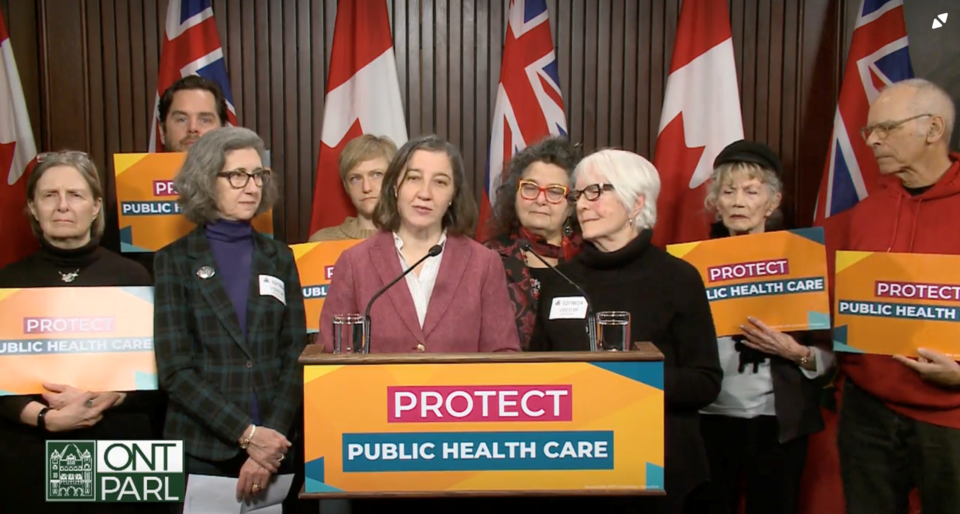Editor's note: This article originally appeared on The Trillium, a Village Media website devoted exclusively to covering provincial politics at Queen’s Park.
As the province grapples with a family doctor shortage, New Democrats are raising concerns about clinics offering health care to Ontarians for hefty fees.
Last fall, the South Keys Health Center in Ottawa made headlines for its plan to charge patients $400 to be enrolled in its nurse practitioner clinics.
At Queen's Park on Friday morning, the NDP raised the alarm about MDDirect, an "executive health" clinic in Toronto that charges patients nearly $5,000 per year.
NDP MPP Jessica Bell said she is "concerned about ... the rise of private medical clinics in Ontario like MDDirect and what this means for the future of health care."
"What we believe is that, in Canada, everyone should get access to good public health care based on need — not on how much you earn, not on where you live, not on the colour of your skin, not on how old you are," said the MPP for University-Rosedale.
"This shouldn't be happening. There shouldn't be clinics in Ontario that charge $4,995 a year in order to access medically necessary care," Bell said.
She accused the Progressive Conservative government of moving on a "path of creating a two-tier health-care system where we have a for-profit care system for people who can pay $4,995 a year to access their doctor and a public health system for the rest of us."
Bell called on the government to "investigate" such clinics for any possible violations of the Canada Health Act and to "enforce the ban on excessive extra-billing and extra fees for medically necessary care."
On its website, MDDirect markets itself as "designed to pick up where other executive health clinics leave off" through its "Healthcare On Demand" program.
An email from the clinic outlining its services obtained by The Trillium states that MDDirect provides "comprehensive annual physicals" along with "extensive diagnostic screening," same-day visits or calls and emails, "24/7 access to their personal physician for urgent health problems," house calls in some instances and patient advocacy during hospital stays or for tests like MRIs.
The annual fees outlined were $3,695 for individuals aged 14–20, $4,595 for those 21–49, $4,795 for people 50–64 and $4,995 for individuals 65 and older.
MDDirect did not respond to questions from The Trillium before publication.
Asked about the NDP's concerns on the clinic, Hannah Jensen, a spokesperson for Health Minister Sylvia Jones, didn't say whether the government would investigate this specific health centre.
"It is a violation of the Commitment to the Future of Medicare Act (CFMA) to charge an individual for an OHIP-insured service or a component of an insured service," Jensen said, adding that patients who think they've been charged for a service covered by OHIP can contact the CFMA program.
"The ministry reviews all possible violations that come to its attention and ensures that all OHIP-insured patients who are charged for an insured service are reimbursed in full," she said.
Natalie Mehra, executive director of the Ontario Health Coalition, said under the Canada Health Act and provincial legislation health clinics aren't allowed to charge for "medically necessary hospital or physician services" or co-mingle unnecessary services with medically necessary services in order to charge patients.
Mehra said she thinks MDDirect and the fees it's charging "crosses the line."
"You can't give preferential access to physicians for people who pay and not give access to physicians for people who can't pay, you cannot do that," she said. "A consult with a physician whether it's the same day or tomorrow or next week, you cannot charge for, urgent care is a covered service ... a physical, if it's medically needed, is a covered service," she said.
Meanwhile, Bell also raised concerns about the family doctor shortage, which groups like the Ontario Medical Association have been trying to draw attention to. She called on the government to include more funding for primary care in its upcoming budget.
Toronto residents who spoke at Queen's Park alongside Bell said they're among around 1,600 patients who lost their family doctor at Taddle Creek Family Health Team last year after the doctor decided to move to MDDirect.
Wendy Campbell said she found out last March that she'd be without a family doctor by the end of June.
"I've reached the age of 87-and-a-half with very good primary care consistently, and it was very scary to have it suddenly gone and to join the hundreds of thousands of people without a family doctor," she said. "I'm able to speak up for myself and I finally found a new doctor. Many of the other 1,600 patients of the clinic may not have been so lucky."
Campbell said this isn't just about one doctor, but rather more for-profit entities cropping up, costs for patients and "moving us away from our values that ensure universal rights."
Jensen said the government has added more than 10,400 new doctors since 2018, including a 10 per cent bump in family doctors. She said the government has been taking other steps to tackle the issue, including adding more medical school seats and reducing barriers so health-care workers who are educated abroad or in other provinces can work in Ontario.
She said the province is also investing $110 million to expand "interprofessional primary care teams."
"Our expansion, in addition to our programs to grow the physician workforce, will ensure 98 per cent of Ontarians are connected to a primary care provider over the next several years," she said.



